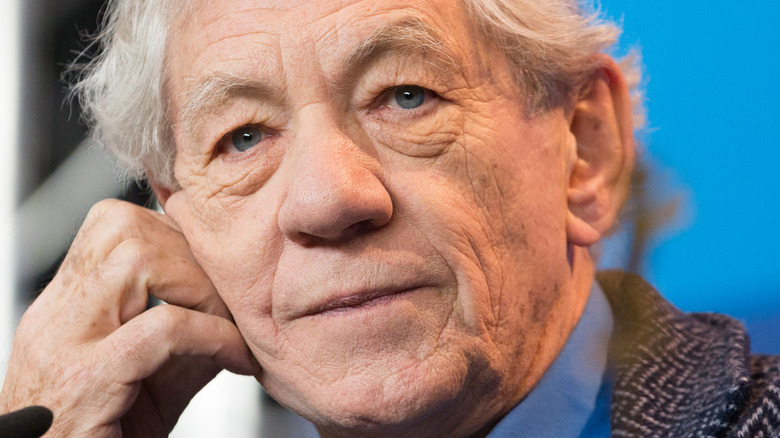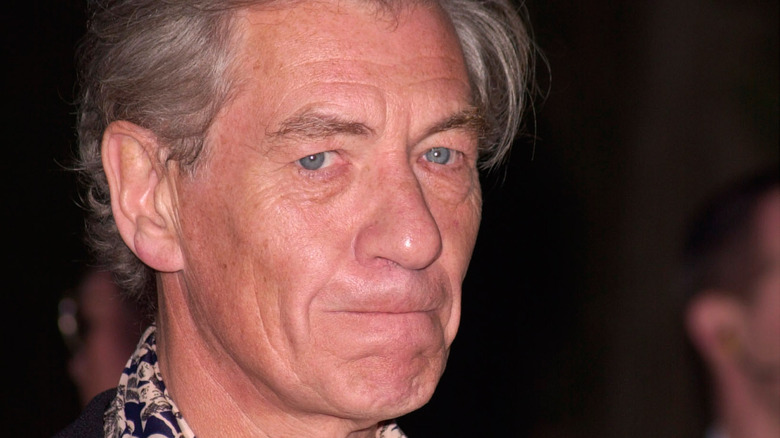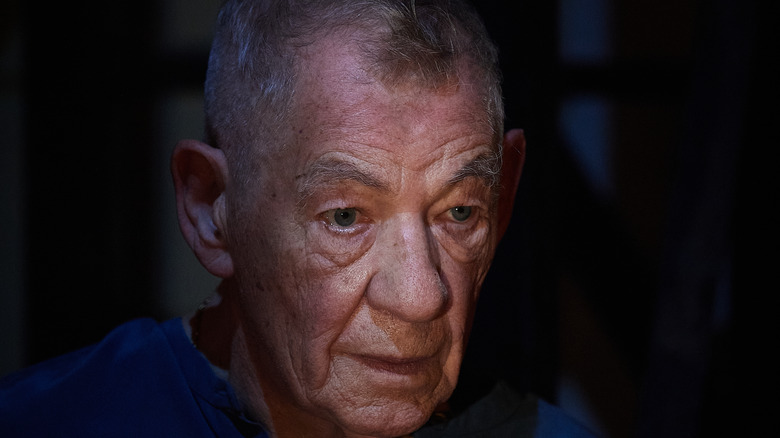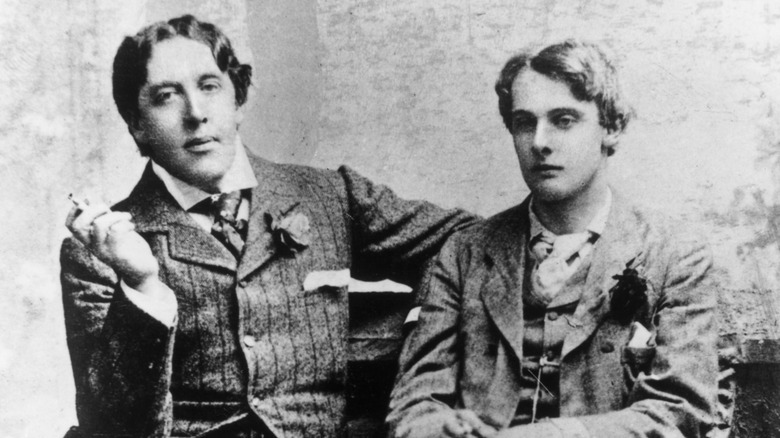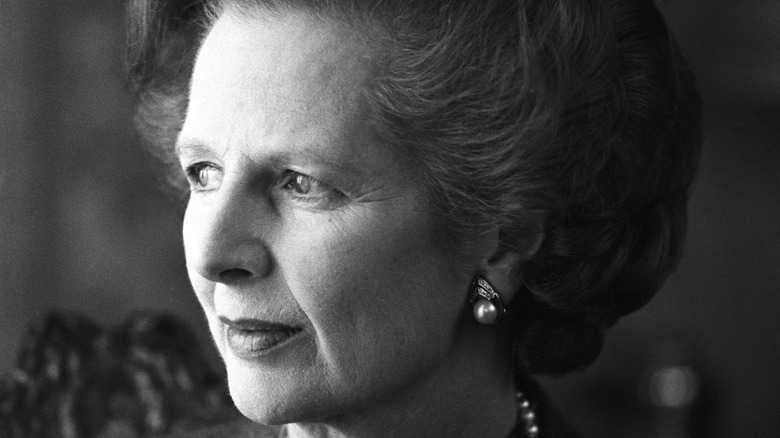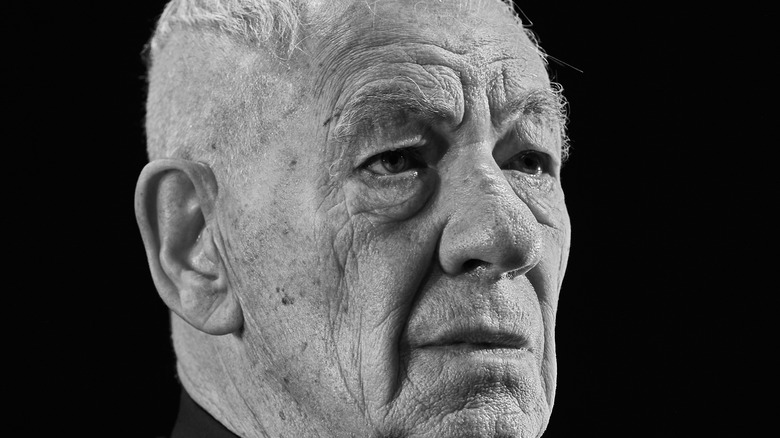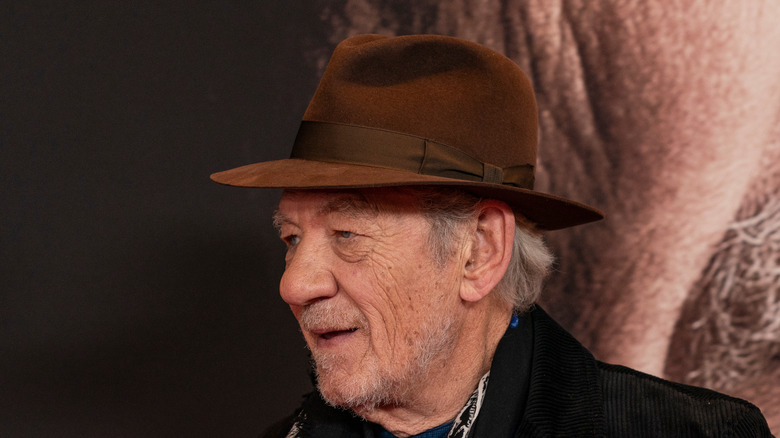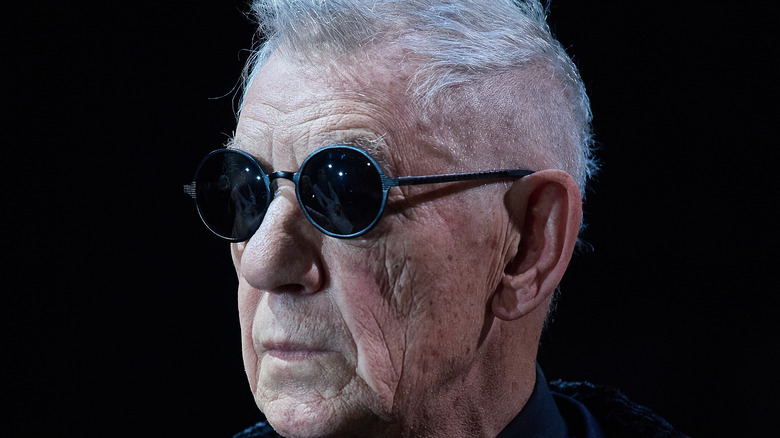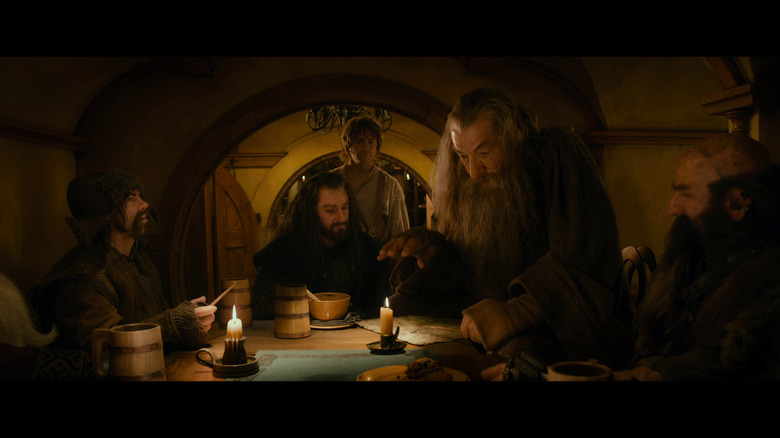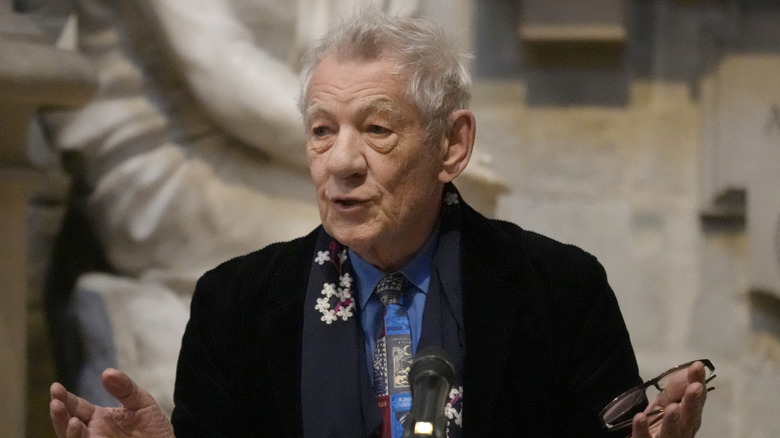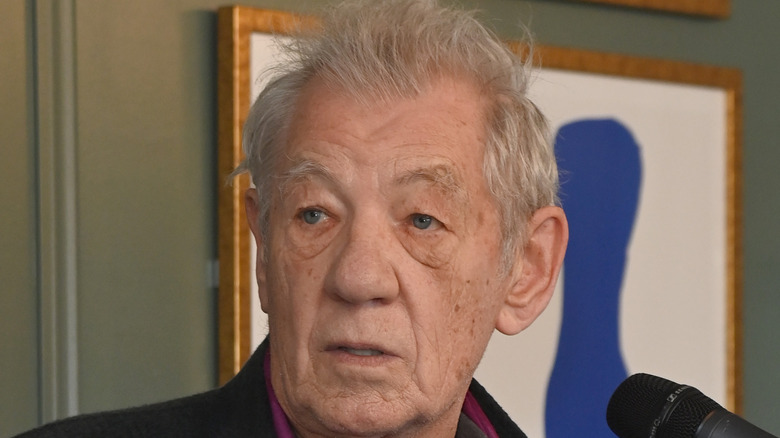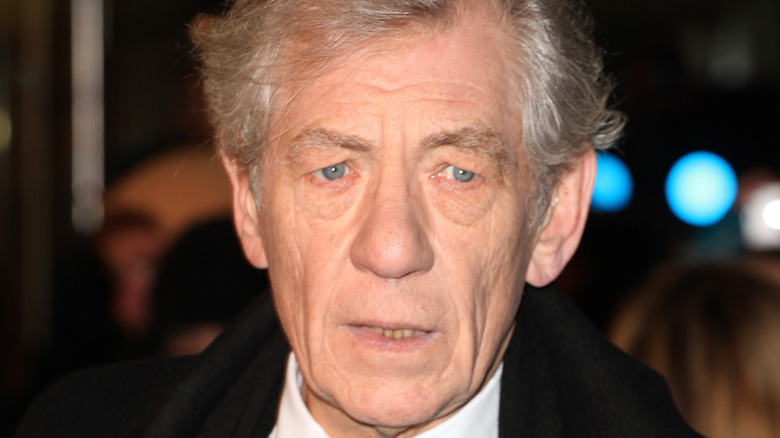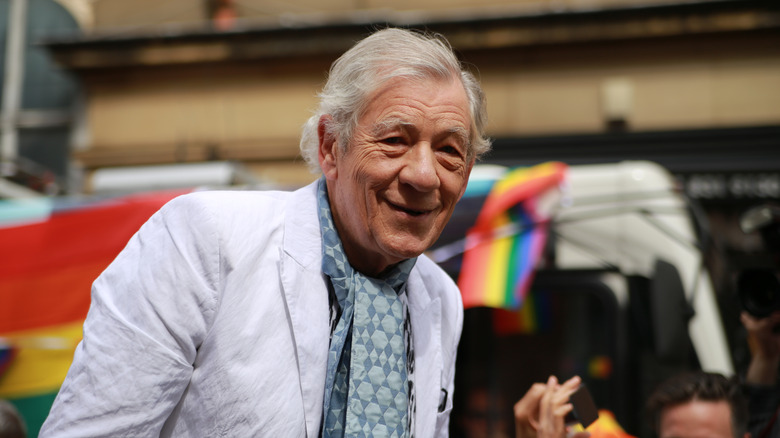Tragic Details About Ian McKellen
Sir Ian McKellen is a gargantuan figure both on the stage and within the geek community. Most know him for his blockbuster roles as Gandalf in both "The Lord of the Rings" and "The Hobbit" trilogies, as well as the older Magneto in several of the "X-Men" films, but decades before his move to Hollywood, the actor firmly established himself in the theater world. McKellen has had a long, distinguished career, yet his massive success was also accompanied by a great deal of adversity and sorrow.
From the deaths of loved ones taken far too soon to the struggle he faced for just being himself, McKellen expericned a great deal of pain and heartbreak. In an age where people like him faced the worst kinds of discrimination, the great actor persevered and became an inspiration to a new generation of future thespians. Below are the trials and tragedies the actor endured as he became one of the greatest of all time.
As a child, Ian McKellen thought war was normal
Long before he earned the title of Sir Ian McKellen, the future actor was born on May 25, 1939, which was only a few months before the U.K. declared war on Germany. Even though he fortunately never had to experience any of the bombing firsthand in his town of Wigan, those first years of his life during World War II were far from ordinary as he needed to do things like sleep under a steel plate at night.
But to support the war effort, food supplies were limited, so many families were forced to survive off of rations that seem like nothing compared to the full supermarkets of today. In the Writings of Ian McKellen, he described the meager diet and said, "On Saturdays, when we stocked up for the week, my mother blended the butter, the margarine and the top of the milk into a spreading paste which only lasted till Thursday. Then it was dry bread until the following weekend. Similarly with meat. We managed a roast on Saturday lunch; which was served cold on Sunday after morning church, then ran out in a shepherd's pie on Mondays."
It was not until McKellen turned 5 years old that the global conflict ended. Yet the end of hostilities did not make sense to him since the war was all he had ever known, as he explained (via Writings), "Only after peace resumed, did I realize that war wasn't normal".
The early death of his mother
Ian McKellen experienced devastating tragedy when he was far too young — his mother, Margery McKellen, experienced breast cancer when he was still a child. As time passed, her condition deteriorated, and she went from being always exhausted to nearly bedridden, but no one had explained to Ian exactly how dire the situation had become (via "Ian McKellen: A Biography"). Even after Margery was taken to Royal Bolton Hospital, her son still believed she would recover.
Then, in August 1951, when he was 12 years old and his mother was still young at 45, Ian traveled to summer camp in Wales. Once there, he received the shocking news that Margery had passed away. The boy deeply loved his mother and was so heartbroken by the loss that even though his family desperately tried to get him to attend her funeral, he refused to go.
Decades later, in an interview with the Daily Mail, McKellen fondly remembered his mother and said (via "Ian McKellen: A Biography"), "I can remember that love. There was never any bad feeling, nothing to disrupt our relationship. The memory I have is of a person who felt fulfilled by her life, by looking after me and my sister, and running the home."
The actor was bullied a lot in his youth
Ian McKellen knew he was different as a child, and his fellow classmates could sense that too — or at least that's what he suspected since they often treated him terribly. But since homosexuality was not nearly as accepted then as it is now, it was an obscure concept to many at the time. At an acting workshop for a play about homophobia, the actor explained the sad circumstances to a group of British schoolchildren and said (via The Telegraph), "Being gay was a topic that was never mentioned when I was your age. We had not really invented the word gay — at school I used to be called Oscar, after Oscar Wilde."
The Irish dramatist and poet, Wilde, was unfairly tried and convicted because of his sexuality, so even if the kids did not truly understand what they were saying, they at least had some idea. And the insults certainly hurt the young McKellen and made a lasting impact on his life.
It was illegal for Ian McKellen to openly be himself for much of his life
Ian McKellen has been open about his sexuality for decades now, but for all of his youth and adulthood up until he was middle-aged, the actor would have been considered a criminal just because of who he loved. In the drama workshop attended by McKellen, the actor explained (via The Telegraph), "When I was 29 it was illegal for me to make love. I had a boyfriend and we slept together, but the law said that we should be in prison. It was very hard to walk out in the street and say to him, don't touch me or brush your hand against mine, there may be a policeman around the corner."
Therefore, the actor kept that part of himself secret from the public and even those close to him for several decades. Then, in the late 1980s, McKellen began to fiercely fight for his rights after the Prime Minister Margaret Thatcher and her administration began to support anti-gay legislation and measures, especially the notorious Section 28.
In the Writings of Ian McKellen, the actor wrote an obituary for Thatcher, which stressed how her actions lit a fire in him and many other activists at the time. He said, "Lest we forget, this nasty, brutish and short measure of the third Thatcher administration, was designed to slander homosexuality, by prohibiting state schools from discussing positively gay people and our 'pretended family relations.' Opposition to Section 28 galvanized a new generation of activists who joined with long-time campaigners for equality."
The loss of both parents by early adulthood
When he was 24, Ian McKellen also lost his father, which sadly left him with neither parent for the rest of his long life. Dennis McKellen's tragic end happened in a car crash when he struck an oncoming vehicle head-on and perished from his grievous injuries only a few days later.
In an interview with the Daily Mail, Ian described the harrowing circumstances and said (via "Ian McKellen: A Biography"), "I think he probably had a stroke because he was on the wrong side of the road. His insides were all bashed, and he never regained consciousness. He lasted three days." What made the loss even worse was that he had finally gotten to a point where he could get closer to his dad but was never able to. Ian added that just when he was feeling good about their relationship and "perhaps we'd have been able to have an adult relationship, my father died. So there was a lot of unfinished business."
The actor's biggest regret is not telling his parents that he's gay
More than anything else, Ian McKellen wishes he could have come out to his parents before they passed away. Since his mother perished when he was so young, he never really had an opportunity to tell her. On the other hand, McKellen was a grown man when his father died and deeply regrets not saying anything about it. When speaking at the drama workshop addressing the struggles of the gay community, McKellen was open about his deep regret and said (via The Telegraph), "My mother died when I was 12, and my father died when I was 24, and I didn't get around to telling him."
For various reasons, both deeply personal and societal, it took a long time before the actor felt comfortable with opening up about himself. When he finally got the courage to tell his stepmother, Gladys, at 49 years old, she was completely unfazed and basically said she had known all along.
Police were almost involved in a rough breakup
In his early 20s, Ian McKellen fell in love with a schoolteacher named Brian "Brodie" Taylor. The couple's relationship lasted eight years from 1964 until the situation became much more complicated when McKellen met an actor named Gary Bond. Cracks had already begun to form in their relationship because McKellen increasingly disliked the feeling of being tied down, and his brief affair with Bond was what truly ended things with Taylor.
When McKellen cut it off in 1972, he moved to a new home in south London. Taylor was so devastated by the breakup, however, that he screamed outside the house until McKellen threatened to call the cops so that he would finally stop. Despite the heartbreak at the time, Taylor later forgave McKellen and then refused to give an interviewer personal details about his former lover, simply stating (via "Ian McKellen: A Biography"), "There really isn't anything I want to get off my chest."
Constant green screens while filming The Hobbit made him break down in tears
While Ian McKellen was able to enjoy the beautiful countryside of New Zealand during the filming of "The Lord of the Rings," that was not the case so much in the production of the following trilogy. "The Hobbit" movies required a more extensive use of green screens, and that was the complete opposite of what the veteran actor looked forward to. One scene, in particular, broke him down because all he had to work with was 13 pictures of the dwarves since they could not be filmed at the same time without breaking the fantasy of their diminutive size.
When talking with Contactmusic.com, McKellen explained how frustrating the experience was and said, "Pretending you're with 13 other people when you're on your own, it stretches your technical ability to the absolute limits. I cried, actually. I cried. Then I said out loud, 'This is not why I became an actor.' Unfortunately the microphone was on and the whole studio heard."
The actor is fighting off cancer
Around the time that "The Hobbit: An Unexpected Journey" was released and Ian McKellen appeared again in one of his most iconic roles as Gandalf, the actor revealed scary news about his health. After noticing his need to use the toilet had become excessive throughout the middle of the night, he decided to get himself checked out. It was a good thing that he did because the results came back that he had prostate cancer. In an interview with the Daily Mirror, McKellen admitted, "You do gulp when you hear the news. It's like when you go for an HIV test, you go 'arghhh is this the end of the road?'"
However, the esteemed actor has the courage of the heroes he plays and is confident that if he remains diligent with checking on his status, he will be ok. He goes on to say, "I've had prostate cancer for six or seven years. When you have got it you monitor it and you have to be careful it doesn't spread. But if it is contained in the prostate it's no big deal." McKellen then added, "I am examined regularly and it's just contained, it's not spreading. I've not had any treatment."
Seeing a dead body forced him to become a vegetarian
Since Ian McKellen grew up in wartime, he did not have the luxury of much meat in his diet as a kid. The actor believes the lack of that type of food early in his life may be the reason why he never found things like steak or fish appetizing in the first place. However, there was one disturbing moment that pushed him over the edge and made him a vegetarian from then on.
In the Writings of Ian McKellen, he explained, "I looked down from my terrace hanging over the Thames one morning. It was low tide and there, stranded on the pebbles, was a four-legged corpse — hairless, white, and bloated. Was it a calf or a sheep or a goat or a dog? I stared at it until the tide rose and washed it away. For 24 hours I was off my food. When I started eating again, I couldn't face meat — fresh or tinned."
The actor's sister, Jean, suffered from cancer and a stroke before passing
As if losing his parents was not enough, right before the release of "The Return of the King," Ian McKellen also lost his sister, Jean. For 18 long months, she experienced eye cancer until she had a stroke and then perished shortly after, according to Gary O'Connor. McKellen was heartbroken because at the time, he was stuck in New Zealand and could not attend her funeral, somewhat similar to when he was unable to be at his mother's. But when he returned, McKellen dedicated a private show to Jean where she had previously performed as a Nayland village player.
Only one year later, the actor had another funeral to go to. The death of his stepmother, Gladys, was more expected in her old age but was still very difficult for McKellen since they had grown close over the years. The two women were the last of his nuclear family left.
Great disappointment with Hollywood
In 2016, Ian McKellen voiced his agreement that the achievements of Black actors have been ignored for far too long in Hollywood, but he also pointed out that the poor treatment applies to people in the gay community as well. When talking to Sky News, the actor said, "As a representative of the industry they're in, it's receiving complaints which I fully sympathize with. It's not only black people who've been disregarded by the film industry, it used to be women, it's certainly gay people to this day. And these are all legitimate complaints and the Oscars are the focus of those complaints of course."
In an interview with The Guardian, McKellen took his criticism a step further to point out a jarring bit of discrimination on the part of the Acadamy. He said, "No openly gay man has ever won the Oscar; I wonder if that is prejudice or chance." The actor then went on to add, "My speech has been in two jackets ... 'I'm proud to be the first openly gay man to win the Oscar.' I've had to put it back in my pocket twice."
After he was not awarded for best actor in 1998, McKellen missed out again even for his brilliant portrayal of Gandalf in "The Fellowship of the Ring," and he felt that the primary reason for the snub was political. According to the actor, the powers that be knew that he planned to use the platform to denounce homophobia, and they were not too keen on that.
